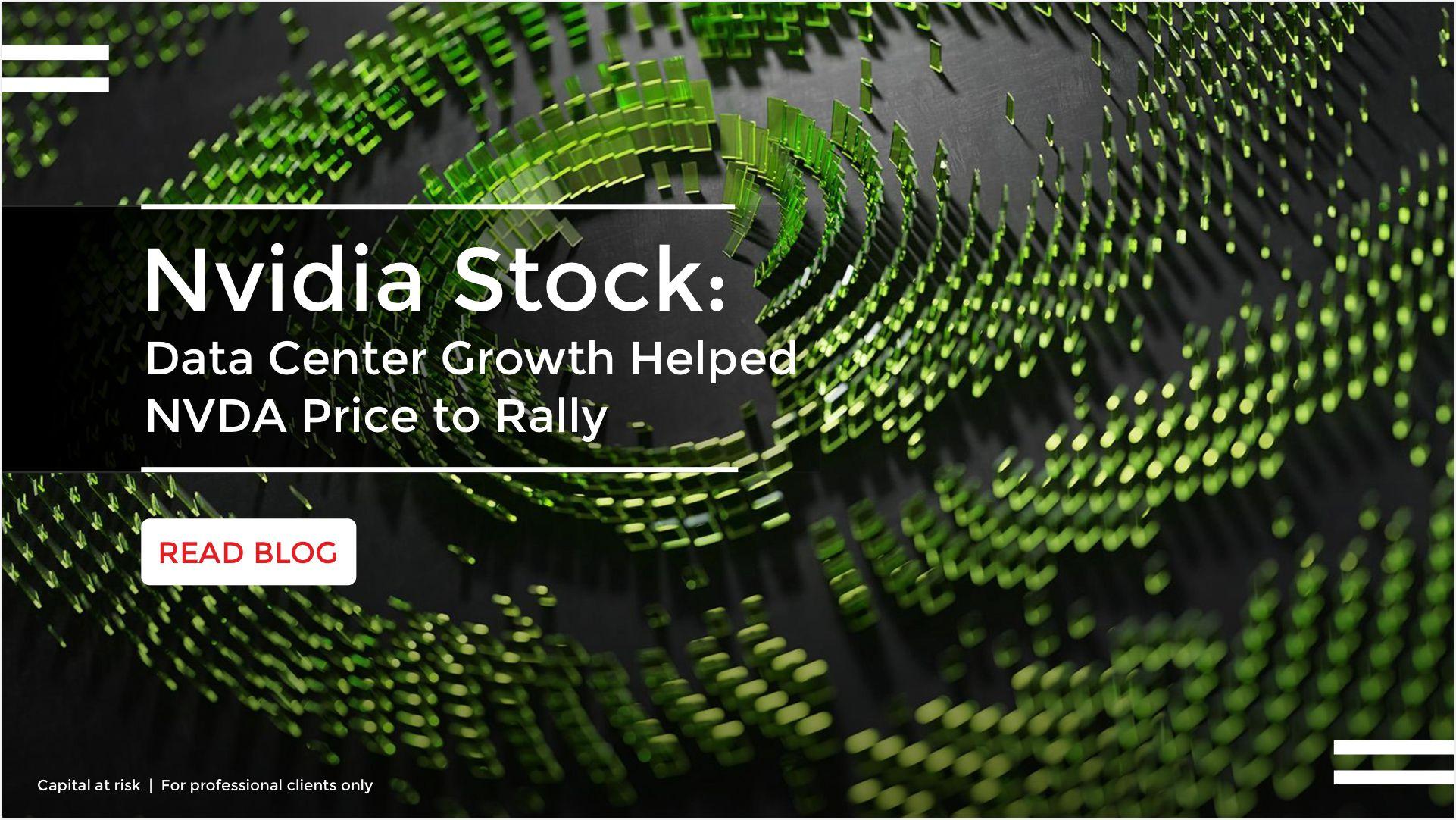Nvidia stock
Posted:
Nvidia Stock: Data Center Growth Helped NVDA Price to Rally
The Nvidia Corporation (NASDAQ: NVDA) is a major semiconductor firm lauded for its cutting-edge graphics processing units (GPU) and visual computing. The company was founded in 1993 by Jensen Huang, Curtis Priem, and Chris Malachowsky. NVIDIA (NVDA) has played a pivotal role in revolutionizing the gaming and computer graphics industries with its powerful GPUs.
Beyond gaming, Nvidia's GPUs are widely used in various sectors, including artificial intelligence (AI), deep learning, data centers, autonomous vehicles, and scientific research. The company's innovations in GPU technology primarily used for video gaming have positioned it as a major player in the tech industry, with a focus on delivering high-performance computing solutions for a wide range of applications.
Nvidia's influence extends beyond hardware, as it also provides software and hardware solutions tailored for specific industries. Its CUDA parallel computing platform and deep learning framework, TensorRT, have become industry standards for AI and scientific computing. With a commitment to pushing the boundaries of what GPUs can achieve, Nvidia continues to be a significant driver of technological advancements and is a key player in the evolving landscape of AI, data centers, and high-performance computing.
The Role of Data Centers in the Tech Industry
Data centers are the backbone of the modern tech industry, playing a pivotal role in enabling the digital world we live in today. These facilities are highly specialized infrastructure hubs designed to store, process, and manage vast amounts of digital data, making them indispensable for a wide range of applications. In essence, it serves as the nerve center of the internet, supporting everything from cloud computing and online services to e-commerce, social media, and more.
The importance of data centers in the tech industry cannot be overstated. They provide the computing power and storage capacity needed to deliver seamless digital experiences to users worldwide. As technology continues to advance, they are at the forefront of innovation, with a growing emphasis on energy efficiency, scalability, and security.
The rise of trends like artificial intelligence, big data analytics, and the Internet of Things (IoT) further underscores the critical role data centers play in the processing and analyzing the vast volumes of data generated daily. In essence, these are the engines that power the digital age, enabling businesses and individuals to harness the full potential of technology for productivity, connectivity, and innovation.
NVIDIA (NVDA) Stock Performance and Recent Developments
NVIDIA stock price has gone up by 18% monthly and a Year-to-date basis has shown an exemplary recovery from the YTD low of $140. For Fiscal 2023 Nvidia's data center revenue has surged up by 51% to $51 billion which is approximately 56% of the total company's revenue. The company's incredible growth for the 12 months ended FY23 was driven by the increasing adaptation of AI, AI applications, and cloud computing customers.
On August 23, 2023, the company announced Q2 FY23 earnings which beat Wall Street's lofty expectations of the company leading to around 9%. The company reported second-quarter revenue of $13.51 billion, up by 101% on a Year-on-Year basis. The surge in revenue was fueled by an increase in demand for its GPUs primarily to power artificial intelligence and generative AI models. NVIDIA's Datacenter segment reported a revenue of $10.32 billion, on a YoY basis it surged by 171%. (Source: Graniteshares).
On August 29, 2023, NVIDIA and Google Cloud announced that they will be expanding their partnership. They will expand the distribution of Google's Artificial Intelligence technology. Nvidia closed near the mark of $500 after rising 4.2% on August 29 to a record high of $487 after the news announcement. Nvidia Shares are now up 234% in 2023, by far the best-performing stock on the S&P 500 index. (Source: CNBC).
Data Center Growth and Nvidia
Nvidia Corp, a prominent technology company known for its graphics processing units (GPUs) and high-performance computing solutions, has been closely aligned with the growth of data centers in recent years. The company recognized the increasing demand for accelerated computing and artificial intelligence (AI) in its operations and strategically positioned itself to cater to this expanding market. Here's how Nvidia has been involved in data center growth:
-
AI and Machine Learning
: Nvidia's GPUs have emerged as a critical component for AI and machine learning workloads in data centers. Their parallel processing capabilities are well-suited for training and inference tasks, enabling them to deliver AI-powered services, such as natural language processing, image recognition, and autonomous systems. Nvidia's CUDA platform and dedicated AI hardware, like the Nvidia A100 Tensor Core GPUs, have become the go-to solutions for these data operators looking to enhance their AI capabilities. -
Data Center Infrastructure
: Nvidia's presence extends beyond GPUs into data center infrastructure. The company has introduced technologies like the Nvidia DGX systems, which are purpose-built AI and deep learning servers. These systems are designed to optimize AI workloads in data centers, offering both hardware and software components to streamline AI development and deployment. -
Partnerships and Collaborations
: Nvidia has formed strategic partnerships with major data center operators, cloud providers, and software companies. These collaborations help integrate Nvidia's GPU technology into data center solutions, making it easier for enterprises to harness the power of GPUs for a wide range of applications, from scientific research to real-time data analytics. -
AI Software Stack
: Nvidia has developed a comprehensive AI software stack that includes libraries, frameworks, and tools, making it easier for data center professionals to leverage GPUs for AI tasks. This ecosystem, which provides for CUDA, cuDNN, and TensorRT, enhances the performance and efficiency of AI workloads within data centers. -
Edge Computing
: Nvidia has also ventured into edge computing, where data processing occurs closer to the source of data generation. This is particularly relevant for applications like autonomous vehicles and IoT devices. Nvidia's Jetson platform offers GPU-based solutions for edge computing, extending its reach beyond traditional data center environments.
Competitors in the Data Center Market
The data center market is highly competitive, with several significant players vying for market share. These companies offer a range of products and services to support the growing demand for data processing, storage, and management. Some of the key competitors in the data center market include:
-
Intel Corporation
: Intel is a leading semiconductor manufacturer and technology company. It provides a wide range of processors, memory, and networking solutions for data centers. Intel's Xeon processors are commonly used in servers and data center infrastructure. -
AMD (Advanced Micro Devices)
: AMD is another major semiconductor company that competes with Intel in the server processor market. Its EPYC processors have gained popularity for their high performance and competitive pricing, making them a strong alternative in data center infrastructure. -
Hewlett Packard Enterprise (HPE)
: HPE is a prominent provider of servers, storage solutions, and networking equipment for data centers. The company offers a comprehensive portfolio of products and services to support data center operations.
Challenges and Risks
Challenges and risks in the data center market include:
-
Energy Efficiency:
They consume substantial amounts of energy, leading to high operating costs and environmental concerns. Striking a balance between performance and energy efficiency is a persistent challenge. -
Security:
Data breaches and cyberattacks pose a significant risk to its operations. Protecting sensitive information and ensuring the integrity of data are ongoing priorities. -
Scalability:
Rapid growth in data volume requires scalable infrastructure. Meeting increasing demands without disruptions can be challenging. -
Infrastructure Costs:
Building and maintaining data centers is capital-intensive. The cost of hardware, cooling, and power can strain budgets. -
Regulatory Compliance:
Data centers must adhere to evolving data privacy and security regulations, which can vary by location. Non-compliance can result in legal and financial consequences. -
Downtime:
Unplanned downtime can lead to revenue loss and damage a provider's reputation. Ensuring high availability is critical. -
Sustainability:
Sustainability concerns drive the need for greener data centers. Meeting environmental standards while maintaining performance is a complex task. -
Competition:
A highly competitive market requires continuous innovation and cost management to remain competitive. -
Technological Obsolescence:
Rapid advancements in technology can render hardware or software outdated, requiring frequent updates. -
Geopolitical Factors:
Political instability, trade tensions, or regional conflicts can impact data center operations, especially for global providers.
Navigating these challenges and mitigating associated risks is essential for data center operators to maintain efficient, secure, and competitive facilities in a constantly evolving technological landscape.
NVIDIA ETPs by GraniteShares
| Product name | Ticker | ||
|---|---|---|---|
| USD | EUR | GBX | |
DISCLAIMER
Please note that GraniteShares' short and leveraged Exchange Traded Products are suitable only for sophisticated investors.
This is a disclaimer stating that all trading and investing comes with risks. Always do your research and do not invest more than you can afford to spend.
GraniteShares accepts no responsibility for any loss or damage resulting directly or indirectly from the use of this blog or the contents.
This blog does not constitute an offer to buy or sell or a solicitation of an offer to buy securities in any company. Nothing contained herein constitutes investment, legal, tax or other advice nor is to be relied upon in making an investment or other decision. No recommendation is made positive or otherwise, regarding individual securities or investments mentioned herein. Any summary list of risk factors does not purport to be a complete enumeration or explanation of the risks involved in a particular investment. Prospective clients must consult with their own legal, tax and financial advisers before deciding to invest. This email contains the opinions of the author and such opinions are subject to change without notice. The source of data is GraniteShares unless otherwise stated. No guarantee is made to the accuracy of the information provided which has been obtained from sources believed to be reliable. This email and the information contained herein is intended only for the use of persons (or entities they represent) to whom it has been provided. Past performance is not a reliable indicator of future results. The value of an investment may go down as well as up and can result in losses, up to and including a total loss of the amount initially invested. Investments may involve numerous risks including, among others, company risks, general market risks, credit risks, foreign exchange risks, interest rate risks, geopolitical risks and liquidity risks. Please note that GraniteShares short and leveraged Exchange Traded Products are for sophisticated investors.


